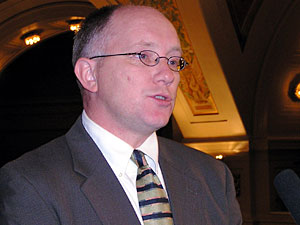Audio
Photos
More from MPR
Your Voice
| |||||||||||||||||||||||||||||||||||||||||||||||||||||||
House passes bill to lower drunken driving limit
March 31, 2004
 |
| The bill's sponsor, Rep. Steve Strachan, said the bill was more about perception than about practice. (MPR Photo/Laura McCallum) |
St. Paul, Minn. — Under current Minnesota law, a driver whose blood-alcohol content tops 0.10 percent is presumed to be intoxicated and unable to drive. The House has voted 113-15 to adopt the stricter DWI threshold of 0.08 percent.
Republican Steve Strachan of Farmington, a Lakeville police officer and the chief author of the tougher standard, says he introduced the measure as a way to reduce death and injury on Minnesota highways.
"This bill is not the first step down the road to making Minnesota the state that prohibits everything. This is not a slippery slope where, very soon, we're going to be talking more about .05 or .03. This is not about protecting us from ourselves. This is about protecting citizens from other people, namely drunk drivers," he said.
But just as compelling for many members are federal incentives that tie certain transportation dollars to adopting the 0.08 standard. Minnesota is one of only three states that haven't yet done so, and the federal government is withholding millions of dollars of highway funding to entice the holdouts.
That provided some support for enacting the new standard this year. But opponents of immediate action argued that those dollars can be completely recovered so long as the state moves to 0.08 by 2007.
Republican Larry Howes of Walker says there's no need to rush and plenty of reason to delay. Howes says the extra time will give local governments a chance to prepare for an increase in their DWI caseloads.
"Just because the federal government is going to put a mandate on us, why should we, then, put a mandate on our local law enforcement agencies, our local governments to enforce this without giving them the tools or the money to do it? We should stop it here, give our local authorities time to adjust, time to prepare for this," he said.
A proposed amendment to enact 0.08 this year was defeated 83-44. Strachan, who personally opposes the delay, says he's still pleased to have passed the new standard at all. He says drunk driving accidents cost Minnesota more than a billion dollars a year due to death, injury, and lost productivity. Strachan says that consideration dwarfs the federal incentives or the costs to local government.
"If you can decrease the number of drunk driving accidents, you start to save huge dollars. But those aren't necessarily on a line item in government. So it's hard for us to get around that. But the fact is, in the big picture, this is, without a doubt, a cost-effective bill," Strachan.
The House bill must now be reconciled with a Senate version that enacts 0.08 later this year. Strachan says he doesn't foresee a problem reaching agreement on when the change should take effect. And he predicts the two sides will find common ground that's closer to the Senate's 2004 start date.
But the chief author of the Senate version says he's not sure what's gained by compromise. DFLer Leo Foley of Coon Rapids also chairs the Senate Crime Prevention and Public Safety Committee. He says there's no reason to enact a provision this year if it won't take effect until later.
"If you're not going to do anything, why should we bother doing anything? The governor has got to continue his support on this. He has to talk to House members and get them moving along," Foley said.
Gov. Tim Pawlenty has previously argued in favor of acting now rather than delaying.
|
News Headlines
|
Related Subjects
|

